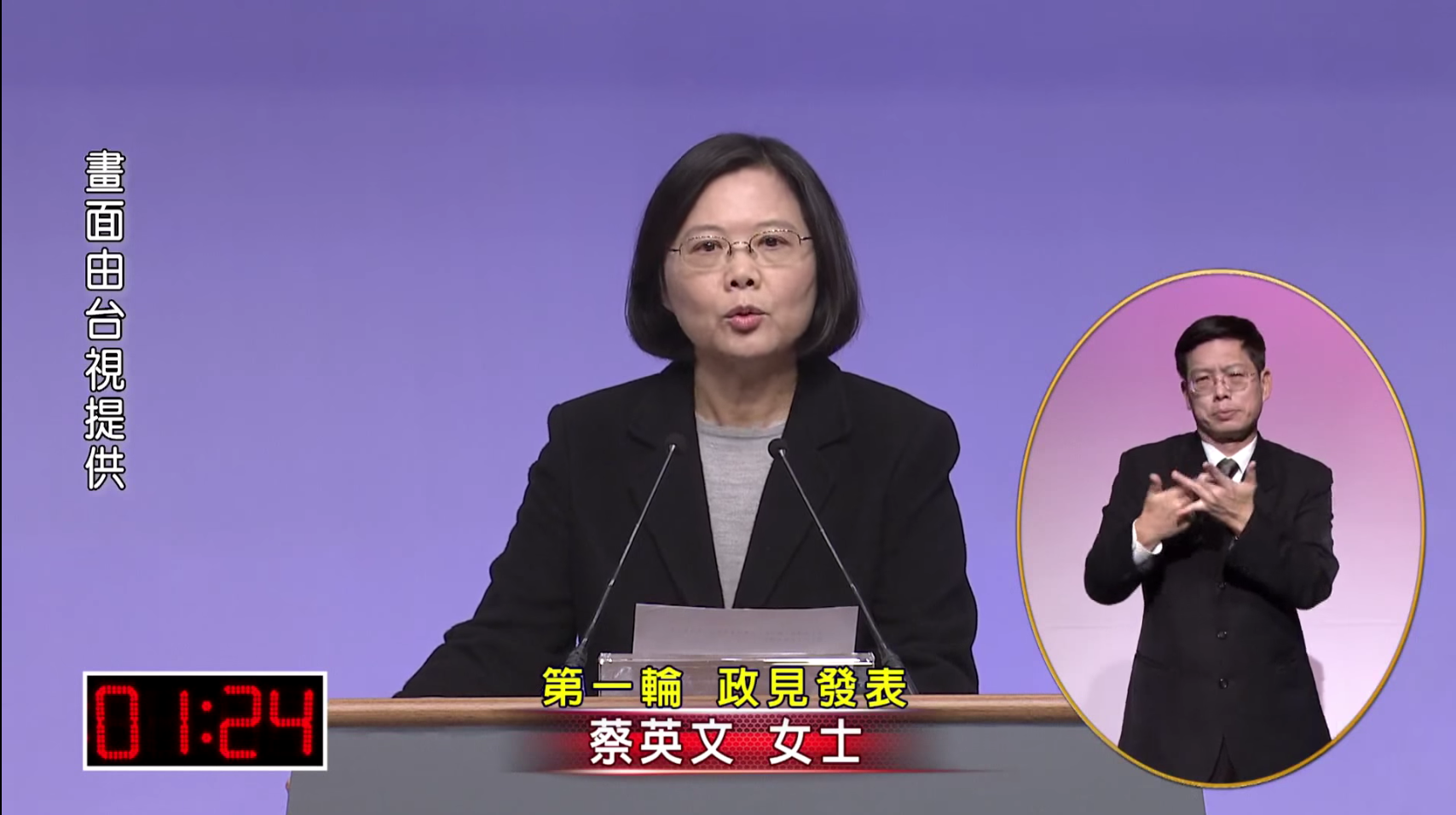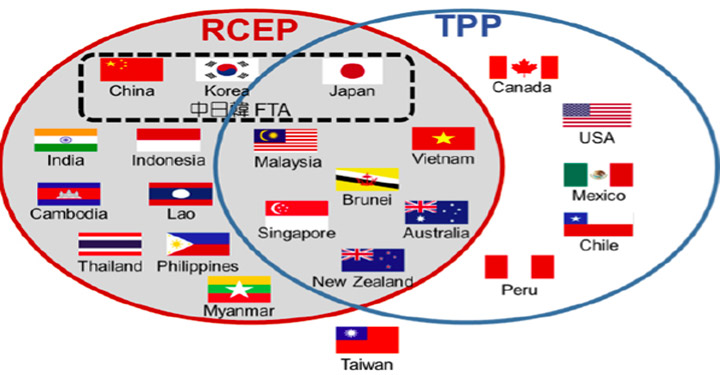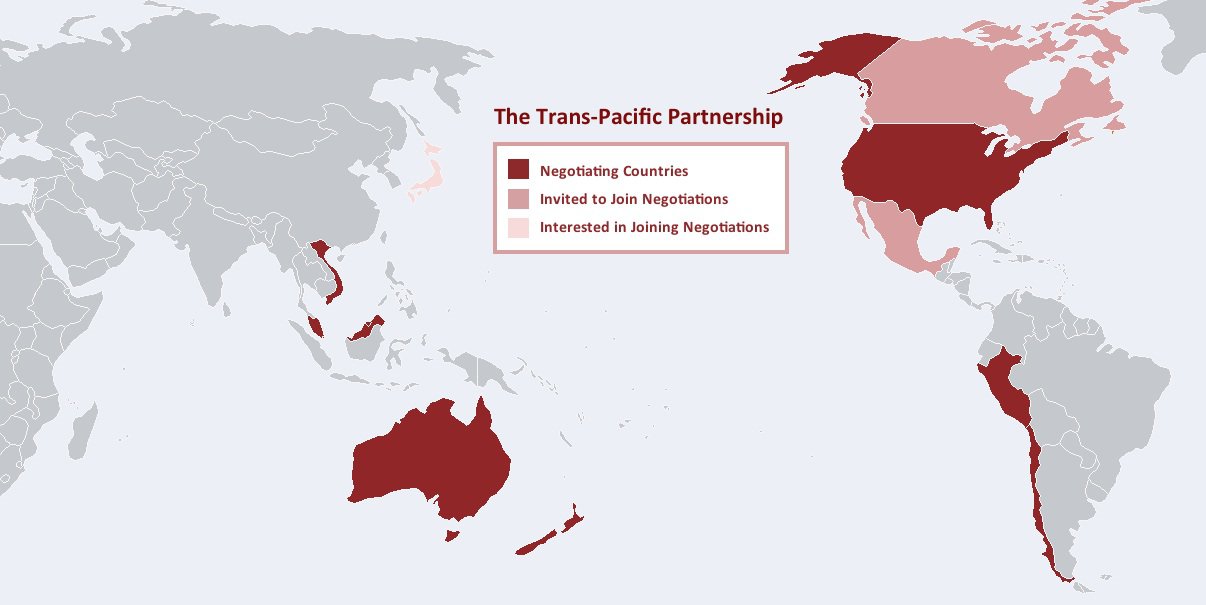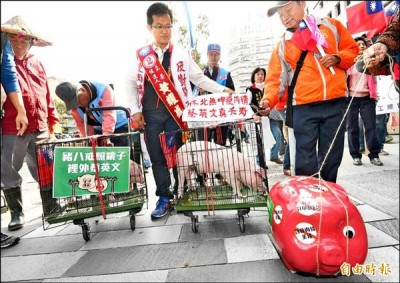by Brian Hioe
語言:
English
Photo Credit: VOA/CC
Tsai Ing-Wen’s Support for FTAs Whether Signed With America or China Alike?
TSAI ING-WEN as a presidential candidate has been unequivocal in supporting Taiwan joining the TPP for some time. Namely, it is argued that Taiwan needs to join the TPP for the sake of its economy, particularly in an age in which Taiwan’s economy is overshadowed by that of China. The all-pressing need of Taiwan is to avoid being left behind economically by the rest of the world, Taiwan’s marginalization already being what it is. Taiwan’s economy, then, would be of critical importance in keeping pace with the rest of the world.
One also suspects that pushing for Taiwan joining the American-led TPP would be aimed at cementing geopolitical alliances with America. It is somewhat surprising, then, that after being pushed by the issue during the second presidential debate by Eric Chu, Tsai Ing-Wen made it a point during the third and final presidential debate to emphasize that she also had always supported Taiwan joining the China-led RCEP. This may be one early sign that in foreign policy Tsai may in fact be willing to sign trade agreements with China in a manner not, in fact, so different from that of Ma Ying-Jeou.
 Tsai during the final presidential debate. Photo credit: 中央選舉委員會
Tsai during the final presidential debate. Photo credit: 中央選舉委員會
Certainly, Tsai will not come to power exactly with the aim of selling out Taiwan to China as a KMT president might, but it is possible that Tsai may bring Taiwan uncomfortably close to China for Taiwanese in the name of what appears to be economic necessity. Looking at past presidential debates, it seems as though it was after Chu confronted Tsai on the issue of the RCEP that Tsai capitulated and stressed that she had always supported Taiwan joining the RCEP. The RCEP is viewed as China’s answer to the American TPP, as an extension of power in the Asia-Pacific.
Yet in truth Tsai was not lying about having always supported the RCEP, given that Tsai’s support for Taiwan joining the RCEP is actually a consistent, longstanding position of hers. When Chu attacked Tsai on the point of the RCEP, Chu was actually attacking Tsai by citing an already existent, publicly open position of Tsai’s. But this position is one which Tsai has not stressed because of possible blowback from the Taiwanese voters, especially youth, who will put her into office on the basis of dissatisfaction with the KMT’s pro-China policies. Notably, this statement by Tsai during the debate did not lead to the controversy which one thought might ensue.
A major reason why Taiwanese will put Tsai into office is because they are dissatisfied with KMT policies which serve to draw Taiwan closer to China, even as this encroaches on Taiwanese sovereignty. So if the KMT spent the past year trying to push forward trade deals signed with China that were met with popular resistance by Taiwanese, will similar policies, which met with resistance when pushed under a KMT president, be passed without a word under a DPP one? Why is it that Tsai supports Taiwan joining both the TPP and RCEP, then? The key may lie in Tsai’s support for the TPP.
Even if advocates of the TPP for Taiwan would generally prefer that Taiwan draw closer to America than to China, one would not be surprised if they turn the logic behind their support of the TPP to also justify Taiwan entering the RCEP. The desire to see economic growth in Taiwan becomes an ideological blind spot to the fact that China would obviously use Taiwan’s status as a member of the RCEP to encroach upon Taiwan’s sovereignty.
Advocates of the TPP downplay the fact that there is always a geopolitical aspect to international trade deals and the danger of geopolitical entanglements for Taiwan, rather claiming that the TPP is a necessary risk Taiwan needs to take, and something of an economic necessity for Taiwan in the present.
 The overlap between RCEP and TPP countries. Photo credit: ATUC
The overlap between RCEP and TPP countries. Photo credit: ATUC
Certainly, it is that joining the US-led TPP would be less of a threat to Taiwan’s sovereignty than joining the China-led RCEP, seeing as the US has no desire to annex Taiwan. But under the right conditions, in which economic growth is prioritized above all other national concerns, one might also see how this logic can come to justify joining the RCEP, also seen as a necessary risk Taiwan needs to take, and a economic necessity for Taiwan in the present, for fear of being excluded from the global economy. Sometimes economic growth seems like such a pressing need that consideration of geopolitical factors are regarded as secondary in importance.
This maybe is the logical fallacy behind Tsai’s support of both the TPP and RCEP. But it may be due time to criticize Tsai Ing-Wen’s uncritical support for Free Trade Agreements, whether with America or China.
Taiwan and the TPP
ONE WOULD oppose Taiwan joining the RCEP for the obvious reason that, as a trade deal signed with China, China would use it as a lever to encroach upon Taiwan’s sovereignty. There is no way around it. Economic policy cannot be thought of as unrelated to foreign policy, especially when dealing with a government like that of China, in which decision-making power in all sectors of government is centralized within the party-state, and which the state has the longstanding practice of use economic policy as a weapon of foreign policy. One may argue that the benefits outweigh the risks, but Taiwan joining a trade bloc led by its existential threat, China, comes with certain intrinsic risks.
Thus, we may turn our attention towards Tsai Ing-Wen’s support for Taiwan joining the TPP. Some advocates of Taiwan joining the TPP have suggested that being wary of geopolitical entanglements with the US, seeing that Taiwan might be wrapped up in potential conflicts it does not want to get involved in, would be overstating the role of the TPP as an instrument of US foreign policy, as well as how the TPP might influence Taiwan’s geopolitical position in the world. Nevertheless, one does not need to raise the specter of geopolitics at all here. This is another case in point in which the pressing need to stimulate economic growth in Taiwan overrides consideration of what even the purely domestic impact of the TPP in Taiwan would be.
 TPP member nations. Photo credit: Bernie Sanders 2016
TPP member nations. Photo credit: Bernie Sanders 2016
It may be ironic to note that, if the Sunflower Movement in early 2014 was against the lack of public transparency behind the “Black Box” CSSTA signed by the KMT with China, the TPP is also a “Black Box” trade deal. TPP negotiations were conducted in secret, and during the process of negotiations even American senators were only allowed to read the text of the TPP in one of two secure, soundproofed reading rooms in the basement of the American Capitol after surrendering electronic devices to security. No notes were allowed be taken within the secure reading room, and senators were not allowed to speak to anyone about the written text—even in cases when senators may need to consult with industry experts or legal experts in order to understand technical aspects. What democratic values would Taiwan discard in the hopes of stimulating economic development?
Why the need for such secrecy? Although member states raised security risks, during the negotiation of the TPP, multinational corporations as Haliburton, Chevron, and Comcast were allowed to sit at the negotiating table. As a result, corporations had a direct influence on the TPP. Though not unique to the TPP, the TPP in fact contains a measure allowing for corporations to sue standing national governments for breaches of international trade treaties signed by that government, allowing corporations to override public interest laws of member nation-states of the TPP in favor of their own incentives to drive profit.
We have problems enough with corporations allowed to demolish homes in Taiwan when they can justify the need to do so for the sake of commercial development. Imagine such problems on a national scale, in which aspects of national infrastructure are made beholden to corporations, who become able to sue the government on the basis of impeding economic development by not living up to the conditions of international trade treaties.
Indeed, pointing to the corporate element of the TPP is hardly just ideological critique based on opposition to corporate capitalism. The TPP may have a very human cost. Nobel Peace Prize-winning organization Doctors Without Borders has come out with a strong stance against the TPP in its present form, on the basis of its strengthening of intellectual property laws to apply them to medicine, meaning that cheaper drugs may be kept out of the market as a result. Given the overinflation of drug prices relative to their production costs, this would ultimately lead to cheap drugs being kept out of the hands of those who need it, to the benefit of large pharmaceutical corporations—which may have a very direct effect on the lives of those in need of life-saving drugs whose prices may now become unaffordable. Probably in general, the TPP would have a negative impact on the semi-welfare state that now exists in Taiwan in order to bring Taiwan in line with the rest of the world.
 Pigs at the KMT rally this past Saturday. Photo credit: Liberty Times
Pigs at the KMT rally this past Saturday. Photo credit: Liberty Times
It is funny, then, that in Taiwan it becomes the KMT who criticizes Tsai on the basis of her support of the TPP. During the past two presidential debates, the issue arose that Taiwan joining the TPP would mean pork imported from the US would have to be allowed into Taiwan, threatening the health of Taiwanese. Of course, it is hypocritical for the KMT to talk about food safety when the KMT has had a hand in letting the violators of past scandals in Taiwan off the hook, but the KMT has made it into a major issue nonetheless. The large-scale KMT rally which took place this past Saturday had, strangely enough, featured pigs brought to the rally as representation of the pork issue. But with the TPP, letting American pork imports into Taiwan would be only the least of TPP entrance conditions which would endanger the welfare of Taiwanese by selling them out to corporations. Is this what we throw overboard in the name of furthering economic development?
The Need for Critique and Oversight
GIVEN THAT Tsai Ing-Wen will likely be the next president of Taiwan, it is due past time to begin criticizing Tsai. If individuals have been afraid to criticize Tsai in the past for fear of damaging her campaign and allowing for the KMT, seeing as it is almost unthinkable Tsai will not be the next president of Taiwan, it is about time to begin criticizing Tsai.
After all, it should be political common sense that no politician should be exempt from criticism, never mind when one is the president of a country. And, as we see with the TPP and RCEP, Free Trade Agreements may be one issue in which Tsai is in need of critique. But broader awareness of this issue remains to be raised among the Taiwanese public.


 Tsai during the final presidential debate. Photo credit: 中央選舉委員會
Tsai during the final presidential debate. Photo credit: 中央選舉委員會 The overlap between RCEP and TPP countries. Photo credit: ATUC
The overlap between RCEP and TPP countries. Photo credit: ATUC TPP member nations. Photo credit: Bernie Sanders 2016
TPP member nations. Photo credit: Bernie Sanders 2016 Pigs at the KMT rally this past Saturday. Photo credit: Liberty Times
Pigs at the KMT rally this past Saturday. Photo credit: Liberty Times